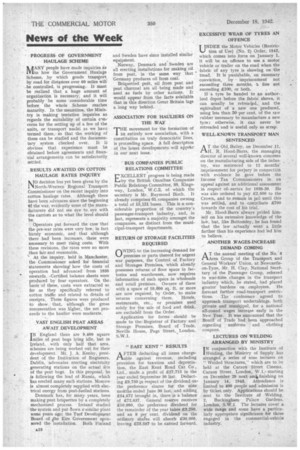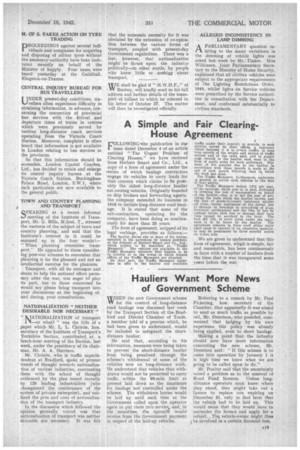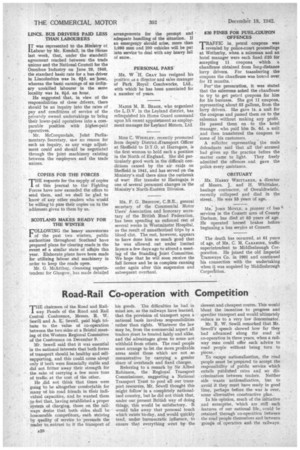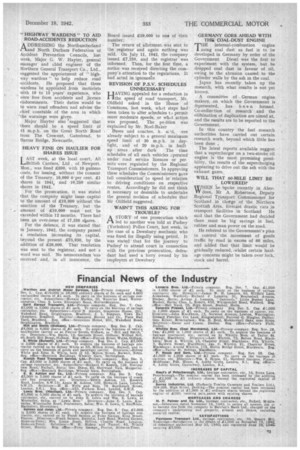News of the Week
Page 20

Page 21

Page 22

Page 23

If you've noticed an error in this article please click here to report it so we can fix it.
• PROGRESSOF GOVERNMENT HAULAGE SCHEME hiTANY people have made inquiries as [Vito how the Government Haulage Scheme, by which goods transport, by road for distances over 60 miles will be controlled, is progressing. It must
be realized that a huge amount of organization is necessary, and it will probably be some considerable time before the whole Scheme reaches maturity. In the meantime, the Ministry is making tentative inquiries as regards the suitability of certain can-. cerns for the setting up of a few of the units, or transport nuclei as we have termed them, so that the working of these can be studied and the documentary system checked over. It is obvious that experience must be obtained before agreements and financial arrangements can be satisfactorily settled.
RESULTS AWAITED ON COTTON HAULAGE RATES INQUIRY
NO decision has yet been given by the North-Western Regional Transport Commissioner on the recent inquiry into cotton haulage rates. Although there have been advances since the beginning IA the war, evidently some of the manufacturers did not see eye to eye with the carriers as to what the level should be.
Operators put forward the case that the pre-war rates were very low, in fact barely economic, and that although there had been increases, these were necessary to meet rising costs. With these revisions, the rates were no more than fair and reasonable.
At the inquiry, held in Manchester, the Commissioner asked for financial statements showing/ how the costs of operation had advanced from 1938 onwards. -Certified balance sheets were produced by four operators. On the basis of these, costs were extracted so far as they specifically referred to cotton traffic and related to details of receipts. These figures were produced to show that, although the gross remuneration was higher, the net proceeds to the haulier were moderate.
VAST ENGLISH PEAT AREAS AWAIT DEVELOPMENT IN England there are 9,400 square miles of peat bogs lying idle, but in Ireland, with only half that area, schemes are being worked out for their development. Mr. J. A. Kenny, president of the Institution of Engineers, Dublin, advocates erecting electricity generating stations on the actual kite of the peat bogs, In this proposal, he is following the lead of Russia, which has erected many such stations. Moscow Is almost completely supplied with electrical energy from peat-fuelled stations.
Denmark has,. for many years, been making peat briquettes by a completely mechanized process. Ireland studied the system and put down a' similar plant some years ago; the Turf Development Board of he Eire Government sponsored the installation. Both Finland and Sweden have since installed similar equipment. Norway, Denmark and Sweden are all erecting installations for making oil from peat, in the same way that Germany produces oil from coal.
Briquetted peat, oil from peat and peat charcoal are all being made and used as fuels by other nations, It would appear from the facts available that in this direction Great Britain lags a long way behind.
ASSOCIATION FOR HAULIERS ON THE WAX
THE movement for the formation of an entirely new association, with a constitution on truly democratic lines, is proceeding apace. A full description of the latest developments will appclar in our next issue.
BUS COMPANIES PUBLIC RELATIONS COMMITTEE
EXCELLENT 'progress is being made by the British Omnibus Companies Public Relations Committee, 88, Kingsway, London, W.C.2, of which the secretary is Mr. Raymond Birch. It already comprises 61 companies owning a total of 13,131 buses. This is a considerable proportion of the country's passenger-transport industry, and, in fact, represents a majority amongst the companies, as distinct from the municipal-transport departments.
RETURN OF STORAGE FACILITIES REQUIRED
OWING to the increasing demand for premises or parts thereof for urgent war purposes, the Control of Factory and Storages Premises which already possesses returns of floor space in factories and warehouses, now requires information of such space in wholesale and retail premises.. Owners of these with a space of 10,000 sq. ft. or more are now required, by Order, to make returns concerning them. Hotels, restaurants, etc., or premises used solely for the sale of food and drink, are excluded from the Order.
Application for forms should be made to the Registrar of Factory and Storage Premises, Board of Trade, Neville House, Page Street,. London, S.W .1 .
"EAST KENT" RESULTS
AFTER deducting all items chargeable against revenue, including provision for taxation and depreciation, the East Kent Road Car Co, Ltd., made a profit of £27,715 in the year ended September 30 last. Deducting £9,750 in respect of the dividend onthe preference shares for the nine months ended June 30 last, and adding ,£54,872 brought in, there is a balance of £72,837. General reserve receives £10,000, the preference dividend for the remainder of the year takes £3,250, and an 8 per cent, dividend on the ordinary shares will absorb £36,000, leaving £23,587 to be carried forWard.
EXCESSIVE WEAR OF TYRES AN OFFENCE
UNDER the Motor Vehicles (Restriction of Use) (No. •2) Order, 1942, which comes into force on January 1, it will be an offence to use a motor vehicle or trailer on the road when the -fabric of any tyre is showing on the tread. It is punishable, on summary conviction, by imprisonment not exceeding three months, 'a fine not exceeding 4100, or both.
If a tyre be handed to an authorized depot before the fabric shows, it can usually be retread,pd, and the equivalent of a new one produced, using less than 50 per cent, of the raw rubber necessary to manufacture a new tyre ; otherwise, it can never be rctreaded and is useful only as scrap.
WELL-KNOWN TRANSPORT MAN SENTENCED
AT the Old. Bailey, on December 11, H. R. Hood.Barrs, the managing director of several well-known concerns on the manufacturing side of the industry, was sentenced to 12 months' imprisonment for perjury in connection with evidence he gave before the Income Tax Commissioners in an appeal against an additional assessment in respect of surtax for 1938-39. He was also ordered to pay £2,500 to the Crown, and to .remain in jail until this was settled, and to contribute £700 towards the cost of his trial.
Mr. Hood-Barrs always prided himself on his extensive knowledge of the law, but, like Bottomley, he has found that the law actually went a little farther than his experience had led him to believe.
ANOTHER WAGES-INCREASE DEMAND COMING AT the annual meeting of the No. Area Group of the Transport and General Workers' Union, at Newcastleon-Tyne, Mr. H. Clay, National Secretary of the Passenger Group, referred to war-time changes in the transport industry which, he stated, had placed greater burdens on employees. He forecast further road-transport restrictions. The conference agreed to approach transport undertakings, both private and municipal, for a national all-round wages increase early in the New Year. It was announced that the Board of Trade had been approached regarding uniforms and clothing coupons.
LECTURES ON WELDING ARRANGED BY MINISTRY
IN conjunction with the Institute of Welding, the Ministry of Supply has arranged a series of nine lectures on " Welded Structures," which are to be held at the Curzon Street Cinema, Curzon Street, London, W.1,, starting on December 28 next anch,finishing on January 14, 1943. Attendance is limited to 400 people and admission is by ticket only. Applications should be sent to the Institute of Welding, 2, Buckingham Palace Gardens, London, S.W.1. The lectures cover a wide range and some have a particularly appropriate significance for those engaged in the commercial-vehicle industry.
M. OF S. TAKES ACTION ON TYRE TRADING
PROCEEDINGS against several individuals and companies for acquiring and disposing of rubber tyres without the necessary-authority have been instituted recently on behalf of the Minister of Supply. Four cases, were heard yesterday at the Guildhall, Kingston-on-Thames.
CENTRAL INQUIRY BUREAU FOR BUS TRAVELLERS
UNDER present-day conditions, travellers often experience difficulty in obtaining information, in advance, concerning the connection of provincial bus services with the arrival and departure times of trains in centres which 'were previously served by various long-distance coach services operating from the Victoria Coach Station. Moreover, complaint is often heard that information is eot available in London relating to bus services in the provinces.
So that this information should be accessible, London Coastal Coaches, Ltd., has decided to retain and enlarge its central inquiry bureau at the Victoria Coach Station, Buckingham Palace Road, London, S.W.1, where such particulars are now available to the general public.
TOWN AND COUNTRY PLANNING AND TRANSPORT QPEAKING at a recent informal meeting of the Institute of Transport, Mr. G. Mills, M.Inst. T., stressed the vastness of the subject of town and country planning, and said that the Institute's interest in it could be summed up in the four words:— " When planning remember transport.'• He appealed to those considering post-war schemes to remember that planning is for the planned and not an intellectual exercise for the planners.
Transport, with all its resources and desire to help the national effort necessary after the war, was eager t6 play its part, but to those concerned he would say please bring transport into your discussions at the beginning of, and during, your consultations,
NATIONALIZATION "NEITHER DESIRABLE NOR NECESSARY" " MATIONALIZATION of transport
1 11—or what? " was the title of a paper which Mr. L. L. Christie, hon. secretary of the Institute of Transport's Yorkshire Section, contributed. at a lunch-hour meeting of the Section, last week, under the presidency of its chairman, Mr. A. A, Harrison.
Mr. Christie, who is traffic superintendent at Bradford, spoke of present trends of thought towards nationalization of various industries, contrasting them with the school of thought evidenced by the plan issued recently by 120 leading industrialists (who ;:hampioned the continuance of the system of private enterprise), and 'outlined the pros and cons of nationaliza-. tion of the transport industry.
In the discussion which followed the opinion generally voiced was that nationalization of transport was neither desirable nor necessary. It was felt that the economic necessity for it was obviated by the extension of co-operation between the various forms of transport, coupled with present-day Government regulations. There was a fear, however, that nationalization might be thrust upon the industry politically—in other words, by people who knew little or nothiqg about transport.
VUE shall be glad if " H.W.H.F.," of VV Bushey, will kindly send us his full address and further details of the transport of ballast to which he referred in his letter of October 27, The matter will then be investigated officially.
ALLEGED INCONSISTENCY IN LAMP DIMMING A PARLIAMENTARY question re
lating to the many variations in the dimming of vehicle lights was asked last week by Mr. Tinker. Miss Wilkinson, , Joint Parliamentary Secretary to the Ministry of Home Security, explained that all civilian vehicles were subject to the appropriate requirements of the Lighting Restrictions Order, 1940, whilst lights on Service vehicles were prescribed by the Service authorities in consultation with her Department, and conformed substantially to civilian standards. LINCS. BUS DRIVERS PAID LESS THAN LABOURERS IT was represented to the Ministry of 1Labour by Mr. Kendall, in the House last -week, that, under the standstill agreement reached between the trade unions and the National Council for the Omnibus Industry on June ,26, 1940, the standard basic rate for a bus driver in Lincolnshire was is. 6jci. an hour, whereas the basic earnings of an ordinary unskilled labourer in the same locality was Is. Sid. an hour.
He suggested that, in view of the responsibilities of these drivers, there should be an inquiry into the rates of pay and conditions of service of the privately owned undertakings to bring their lower-paid operatives into a comparable position with higher-paid operatives.
Mr. McCorquodale, Joint Parliamentary Secretary, saw no reason for such an inquiry, as any wage adjustment could and should be negotiated through the joint machinery existing between the employers and the trade unions.
COPIES FOR THE FORCES THE requests for the supply of copies of this journal to the Fighting Forces have now exceeded the offers to send them, and we shall be glad to know of any other readers who would be willing to pass their copies on to the addresses given to them by us.
SCOTLAND MAKES READY FOR THE WINTER
FOLLOWTNG the heavy snowstorms of the past two winters, public authoritiet throughout Scotland have prepared plans for clearing roads in the event ef a similar state of affairs this year. Elaborate plans have been made for utilizing labour and machinery in order to keep the roads open.
Mr. G. McArthur, cleansing superintendent for Glasgow, has made detailed arrangements for the prompt and adequate handling of the situation_ If an emergency should arise, more than 1;000 men and 200 vehicles will be put into service to deal with any heavy fall of snow.
PERSONAL PARS'
MR. W H. GRAY has resigned his position as a director and sales manager of Park Royal Coachworks. Ltd., with which he has been associated for a number of years.
MAJOR M. R. BEASE, who organized the L.D.V. in the Leyland district, has relinquished his Home Guard command upon hi 's recent appointment as employment manager for Leyland Motors, Ltd MISS C. WHCELEY, recently promoted from deputy District •Transport Officer at Sheffield to D.T.O. at Harrogate, is the first woman to hold such a position in the North of England. She did particularly good work in the difficult conditions caused by the air raids on Sheffield in 1941, and has served on the Ministry's staff there since the outbreak of wart Her transfer to Harrogate is one of several personnel changes in the Ministry's North-Eastern Division_ MR. F. G. BRISTOW, C.B.E., general secretary of the Commercial Motor Users' Association and honorary secretary of the British Road Federation, has been spending an enforced rest of several weeks in Westminster Hospital, as the result of unauthorized trips by a blood clot. The rest, however, appears to have done him so much good that he was allowed out under limited licence a few days ago to attend a meeting of the Standing joint Committee. We hope that be will soon receive the full licence and be in complete rtuaning order again after this suspension and subsequent overhaul. £20 FINES FOR FUEL.COUPON OFFENCES
TRAFFIC in petrol coupons was revealed by police-court proceedings at Wetherby, when a salesman and an hotel manager were each fined .-C20 for accepting 11 coupons which a chauffeuse obtained from tong-distance lorry drivers. For transferring the coupons the chauffeuse was bound over for 12 months.
For' the prosecution, it was stated that the salesman asked the chauffeuse to try to get petrol coupons for him for his business. She got II coupons, representing about 55 gallons, from the lorry drivers. She gave Is. a unit for the coupons and passed them on to the salesman without making any profit. He passed them on to the hotel manager, who paid him 2s. 6d. a unit and then transferred the coupons to some of his customers.
A solicitor representing the male defendants said that all the" accused had given up the practice before the matter came to light. They, freely admitted the offences and gave the police every assistance.
OBITUARY MR. HARRY WHITTAKER, a director of Messrs. J. and H. Whittaker. haulage contractor, of Oswaldtwistle, recently collapsed and died in the street. He was 5a years of age.
MR. JOHN MOYLE, a pioneer cf bus services in the Consett area of County Durham, has died at 63 years of age. He operated horsed brakes before beginning a bus service at Consett.
The death has occurred, at 61 years of age, of MR. C. M. CARABINE, traffic superintendent to Middlesbrough Corporation. He joined the old Imperial Tramways Co. in 1901 and continued his connection with the undertaking when it was acquired by Middlesbrough Corporttion. "HIGHWAY WARDENS" TO AID
ROAD-ACCIDENTS 'REDUCTION A DDRESSING the Northumberland --Mind North Durham Federation of Accident Prevention Councils, last week, Major G. W. Hayter, general manager and chief engineer of the Northern General Transport Co., Ltd., suggested the appointment of " highway wardens " to help reduce road accidents. He proposed that these wardens be appointed from motorists with 10 to 15 years' experience, who were free from accidents and ,licence endorsements. Their duties would be to warn road offenders and advise the chief constable of the area in which "the warnings were given. Major Hayter also 'suggested that there should be a speed limit of 15 m.p.h. on the Great North Road from The Crescent, Gateshead, to Barras Bridge, Newcastle.
HEAVY FINE ON HAULIER FOR SHARES ISSUE
LAST week, at the local court, All .British Carriers, Ltd , of Newport. Mon., was fined 2500, with 10 guineas costs, for issuing, without the consent of the Treasury, 10,000 6.per cent. 21 shares in 1941, and 10,250 similar shares in 1942.
For the prosecution, it was stated that the company might issue capital to' the amount of 210,000 without the sanction of the Treasury, but the amount of 210,000 must not be exceeded within 12 months. There had been an over-issue of 17,250 stares.
For the defence, it was stated that in January, 1942, the company passed a resolution increasing its capital, beyond the present 275,950, by the addition of 2,20,000. That resolution was sent to the registrar, and not a word was said. No memorandum Was received and, in all innocence, the Board issued 210,000 to one of their number. '
The return of allotment was sent to the registrar and again nothing was said. On July 11, 1942, the company issued 27,250, and the registrar was informed. Then, for the first time, a notice was received directing the company's attention to the regulations. It had acted in ignogante
REVISION OF P.S.V. SCHEDULES UNNECESSARY
HAVING appealed for a reduction in the speed of road transport, Mr. Oldfield asked in the House of Cominons, last week, whit steps had been taken to alter schedules t permit more moderate speeds, or whot action was proposed. The po dtion was explained by Mr. Noel-Baker , Buses and coaches, h srd, ,ere already subject to a general maxireum speed limit of 30 m.p.h. in daylight, and of 20 m.p.h. in built up areas after dark The time schedules of all such vehicles operated under road service licences or per. mits were regulated by the Regional Transport CommisSioners. In approving these schedules the Commissioners gave full considerationto speed in relation to driving conditions on respective routes. Accordingly he did not think it necessary or desirable to undertake the general revision of schedules that Mr Oldfield suggested.
WASN'T THIS ASKING FOR TROUBLE?
ASTORY of one prosecution which led to another was told at Pudsey (Yorkshire) Police Court, last week, in the case of a Dewsbury mechanic who was fined for illegally using petrol. It was stated that for the journey to Pudseyr to attend court in connection with the previous prosecution, defendant had used a lorry owned by his employers at Dewsbury
GERMANY GOES AHEAD WITH THR COAL-DUST ENGINE
TIIE internal-combustion engine using coal dust as fuel is to be developed in Germany by order of the Government Diesel was the first to experiment with the system, but he dropped coal dust in favour of oil, owing to the abrasion caused to the cylinder walls by the ash in the coal.
Japan has recently taken up the research, with what results is not yet known.
A committee of German engine makers, on which the Government is fepresented, has been formed. Co-ordinPtion of research' and the eliffiination of duplication are aimed at, and the results are to be reported to the Government.
In this country the fuel research authorities have carried out certain research work, beyond which little has been done .
The latest reports available suggest that a supercharger on a two-stroke oil engine is the most promising possibility, the results of the supercharging appearing to drive out the ash with the exhaust gases..
WILL THAT 60-MILE LIMIT BE LOWERED?
WHEN he -spoke recently in Aber VY Mr A. Robertson, Deputy Regional Transport Commissioner for Scotland in charge of the Northern Scottish Area, forecast drastic cuts in transport facilities in Scotland He said that the -Government had decided there must be big savings in fuel, rubber and man power on the road.
He referred to the Government's plan to control • the movement of goods traffic by road in excess of 60 miles, and added that that limit would be gradually reduced, .whilst certain haulage concerns might be taken over lock, stock and barrel.




















































